Fleurs du Mal Magazine


Or see the index
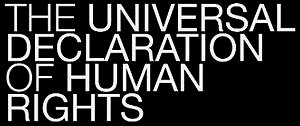
Met Marie-Bénédicte Dembour, Geert-Jan Knoops en Eduard Nazarski
Wat moeten we met de Universele Verklaring van de Rechten van de Mens? Als mensenrechten overal ter wereld – zelfs in Nederland – geschonden worden, kunnen we ze dan niet beter afschaffen?
41e Globaliseringslezing bij het 65-jarig bestaan van de
Universele Verklaring van de Rechten van de Mens.
In samenwerking met Amnesty International
Marie-Bénédicte Dembour, hoogleraar mensenrechten aan de Universiteit van Brighton, vraagt zich af hoe universeel de UVRM eigenlijk is. Wat heb je aan een verklaring als die te pas en te onpas wordt misbruikt of ingezet voor politieke belangen? Advocaat Geert-Jan Knoops, hoogleraar Internationaal Strafrecht aan de Universiteit Utrecht, verdedigde als strafpleiter verdachten van het schenden van mensenrechtenbij het Europees Hof van de Rechten van de Mens en verschillende internationale strafhoven als die van voormalig Joegoslavië, Rwanda en Sierra Leone. Hij houdt een pleidooi voor het belang van de UVRM. Discussie onder leiding van Bahram Sadeghi met commentaar van Eduard Nazarski, directeur Amnesty International.
In het voorprogramma: Amnesty International Nederland presenteert: Eleanors thee. Het ontstaan van de Universele Verklaring van de Rechten van de Mens van mensenrechtenspecialist Daan Bronkhorst over de wonderlijke totstandkoming van de UVRM. Fokke Obbema, redacteur buitenland van de Volkskrantspreekt ter plekke een recensie uit. Kan de Universele Verklaring met pensioen? Wat heeft een mensenrechtenactivist aan de UVRM? Marian Mandache uit Roemenië, Molly Melching uit Senegal, Houzan Mahmoud uit Koerdisch Irak en Olga Sadovskaya uit Rusland geven via Skype commentaar.
Laat ter plekke een letter zetten! Doe mee met The Human Rights Tattoo van de Tilburg Cowboys: de complete verklaring van de Rechten van de Mens getatoeëerd in 6773 letters op evenzoveel mensen, uitgevoerd door Walls and Skin in de patio van Felix Meritis. In de foyer: schrijfmarathon van Amnesty International
Woensdag 11 december 2013, Felix Meritis te Amsterdam
Human Rights Tattoo: van 16.00 tot 19.00 in de patio
Aanvang programma: 19.00 uur
Aanvang lezing en discussie: 20.30 uur
Kaarten aan de kassa van Felix Meritis of via: www.felix.meritis.nl
Toegang: €13,50, met korting: €10,-
website: http://www.globaliseringslezing.nl/
fleursdumal.nl magazine
More in: Art & Literature News, REPRESSION OF WRITERS, JOURNALISTS & ARTISTS
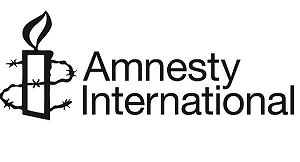
Gedetineerde zangeres Pussy Riot vermist
Pussy Riot-bandlid Nadezhda Tolokonnikova zou volgens geruchten worden overgebracht van de strafkolonie waar ze zat naar een andere in Siberië. De Russische autoriteiten weigeren te bevestigen waar zij is. Sinds 22 oktober is niets meer van haar vernomen.
Nadezhda klaagde dat gevangenispersoneel haar bedreigde. Ook sprak ze publiekelijk over de slechte gevangenisomstandigheden. Amnesty vreest dat ze nu hiervoor wordt gestraft.
De Russische autoriteiten moeten Nadezhda’s familie onmiddellijk vertellen waar ze wordt vastgehouden. Als ze echt naar Siberië is overgebracht, betekent dit dat ze duizenden kilometers is verwijderd van haar familie en advocaat, waardoor bezoek van hen bijna onmogelijk wordt. Dit zou een mensenrechtenschending zijn en bovendien een schending van Ruslands eigen wetten.
Nadezhda werd samen met bandleden Maria Alekhina en Ekaterina Samutsevich tot twee jaar strafkamp veroordeeld omdat ze in februari 2012 in een Moskouse kathedraal een protestlied zongen dat gericht was tegen de Russische president Poetin. Ekaterina werd vorig jaar in hoger beroep vrijgesproken. Maria en Nadezhda zijn gewetensgevangenen en hadden nooit veroordeeld mogen worden.
8 november 2013
# meer info website amnesty international
fleursdumal.nl magazine
More in: Art & Literature News, REPRESSION OF WRITERS, JOURNALISTS & ARTISTS

Stop de repressie in Rusland. Kies voor vrijheid
Sinds Vladimir Poetin op 7 mei 2012 voor een derde termijn als president van Rusland werd beëdigd, verslechtert de mensenrechtensituatie in het land in hoog tempo. Met nieuwe wetten legt Poetin stap voor stap critici het zwijgen op.
In vrijheid je mening verkondigen wordt voor Russen steeds moeilijker. En gevaarlijker. Met name journalisten, mensenrechtenactivisten, advocaten, homo’s en kunstenaars zijn het mikpunt.
Critici hangen boetes van meer dan 100.000 euro boven het hoofd voor ‘laster’ en ‘smaad’. Daarmee worden journalisten, activisten, bloggers en anderen afgeschrikt hun mening te uiten.
De definitie van ‘hoogverraad’ is aanzienlijk verruimd. Iedereen die contacten met buitenlanders onderhoudt, kan nu worden vastgezet.
Organisaties die financiële steun uit het buitenland ontvangen of die ‘politieke activiteiten ondernemen’, zijn verplicht zich als ‘buitenlandse agent’ te laten registreren. Doen ze dat niet dan riskeren ze een boete of zelfs gevangenisstraf. Inmiddels hebben bij zo’n honderd ngo’s onaangekondigde inspecties plaatsgevonden.
Demonstreren is praktisch onmogelijk gemaakt. Wie zonder toestemming demonstreert, riskeert een draconische boete.
Onwelgevallige websites kunnen worden geblokkeerd.
En er is een nieuwe wet die homo’s terug de kast in stuurt: informatie verspreiden over homoseksualiteit onder minderjarigen is verboden. Op ‘homopropaganda’ (lees: hand in-handlopen, elkaar een kus geven) staan boetes.
Kom in actie tegen de repressie in Rusland
De nieuwe wetten zijn in strijd met de internationale verplichtingen die Rusland heeft en met haar eigen Grondwet. Ze moeten worden ingetrokken.
# Teken de petitie op de website van Amnesty International
fleursdumal.nl mal
More in: REPRESSION OF WRITERS, JOURNALISTS & ARTISTS
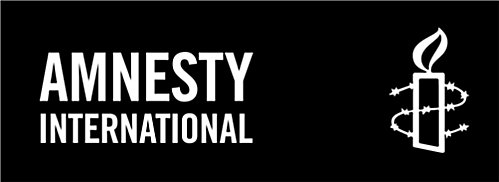
USA: Commute Bradley Manning’s sentence and investigate the abuses he exposed
President Obama should commute US Army Private Bradley Manning’s sentence to time already served to allow his immediate release, Amnesty International said today.
Military judge Col Denise Lind today sentenced the Wikileaks source to 35 years in military prison – out of a possible 90 – for leaking reams of classified information. He has already served more than three years in pre-trial detention, including 11 months in conditions described by the UN Special Rapporteur on Torture as cruel and inhumane.
“Bradley Manning acted on the belief that he could spark a meaningful public debate on the costs of war, and specifically on the conduct of the US military in Iraq and Afghanistan. His revelations included reports on battlefield detentions and previously unseen footage of journalists and other civilians being killed in US helicopter attacks, information which should always have been subject to public scrutiny,” said Widney Brown, Senior Director of International Law and Policy at Amnesty International.
“Instead of fighting tooth and nail to lock him up for the equivalent of several life sentences, the US government should turn its attention to investigating and delivering justice for the serious human rights abuses committed by its officials in the name of countering terror.”
Some of the materials Manning leaked, published by Wikileaks, pointed to potential human rights violations and breaches of international humanitarian law by US troops abroad, by Iraqi and Afghan forces operating alongside US forces, and by military contractors. Yet the judge had ruled before the trial that Private Manning would not be able to defend himself by presenting evidence that he was acting in the public interest.
“Manning had already pleaded guilty to leaking information, so for the US to have continued prosecuting him under the Espionage Act, even charging him with ‘aiding the enemy,’ can only be seen as a harsh warning to anyone else tempted to expose government wrongdoing. ” said Brown.
“More than anything else, the case shows the urgent need to reform the USA’s antiquated Espionage Act and strengthen protections for those who reveal information that the public has a need and a right to know.”
Manning’s defence counsel is expected to file a petition for clemency shortly with the U.S. Department of Justice office that reviews requests for pardons and other acts of clemency before passing them on to the President for a final decision. Such requests are normally made after all appeals are exhausted, but the President may grant clemency at any time.
“Bradley Manning should be shown clemency in recognition of his motives for acting as he did, the treatment he endured in his early pre-trial detention, and the due process shortcomings during his trial. The President doesn’t need to wait for this sentence to be appealed to commute it; he can and should do so right now,” said Brown.
Amnesty International 21 august 2013
≡ website amnesty international
fleursdumal.nl magazine
More in: REPRESSION OF WRITERS, JOURNALISTS & ARTISTS

UK must account for its actions to repress Guardian reporting on surveillance
Attacks on the Guardian newspaper by UK authorities mark a new low in the struggle to protect freedom of expression, the right to information and protecting the independence of the media in the UK, Amnesty International said today.
The Guardian has reported that the UK authorities repeatedly threatened the newspaper’s management and led to it being forced to destroy information it had received from the US whistleblower Edward Snowden. This information is about unlawful surveillance by the US and the UK governments which violates their citizens’ and other people’s right to privacy.
“Forcing the Guardian to destroy information received from a whistleblower, without the authority of a court order, is a sinister turn of events that is both criminal and reprehensible,” said Tawanda Hondora, Deputy Director of Law and Policy at Amnesty International.
“This is just another example of the government trying to undermine press freedoms. It also seriously undermines the right of the public to know what governments do with their personal and private information. If confirmed, these actions expose the UK’s hypocrisy as it pushes for freedom of expression overseas.
“The UK government must explain its actions and publicly affirm its commitment to the rule of law, freedom of expression and the independence of the media. They should initiate an inquiry into who ordered this action against the Guardian.”
“Using strong-arm tactics to try to silence media outlets and reports that divulge information relating to Prism and other surveillance efforts, is unlawful and clearly against the public interest.”
The Guardian editor Alan Rusbridger on Monday published allegations about the UK authorities’ actions over the past several months to pressure the newspaper to hand over or destroy evidence related to the government surveillance.
Amnesty International 20 august 2013
≡ website amnesty international
fleursdumal.nl magazine
More in: REPRESSION OF WRITERS, JOURNALISTS & ARTISTS
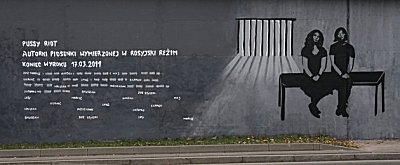
Russia escalating attacks on free expression a year on from Pussy Riot protest
A year after the punk band Pussy Riot performed a protest song in Moscow’s main Orthodox cathedral, the situation for freedom of expression has only worsened in Russia, Amnesty International said.
Last year’s arrest and criminal conviction of Pussy Riot members under the dubious charge of “hooliganism on the grounds of religious hatred” signalled a fresh and severe clampdown on human rights in the country.
Since then Russia’s Parliament has adopted several new laws targeting activists and those critical of the authorities.
“New laws introduced since the Pussy Riot protest have given the authorities sweeping powers to clamp down on NGOs, human rights and political activists in Russia and go against the country’s international human rights obligations,” said John Dalhuisen, Europe and Central Asia Programme Director at Amnesty International.
“Meanwhile, two Pussy Riot band members are still languishing in a prison colony far from their families, including small children – and our call for their immediate release continues.
“Russia’s government is failing to live up to promises made to its citizens 20 years ago after the collapse of the Soviet Union. It desperately needs to show a commitment to upholding human rights and must stop peddling the disingenuous line that civil liberties and social, economic and political stability are incompatible in Russia.”

Fresh attacks on free speech
In June 2012, Russian authorities introduced further restrictive rules on conducting public protests, along with exceptionally high penalties of up to US$32,000.
The same month libel – which had only a few months earlier been de-criminalized – made its way back into the Criminal Code, with heftier fines than before.
In November 2012, a new law was introduced which requires NGOs receiving overseas funding to register as ‘foreign agents’. This not only puts additional administrative burden on them, but more importantly, may create negative perceptions of their activities due to the negative connotation ‘foreign agent’ in the Russian language.
That month a broad new legal definition of “treason” was also introduced, which could potentially criminalize human rights and political activism.
And in December, Russia’s Parliament passed the so-called “Dima Yakovlev” law, imposing further severe restrictions on NGOs and introducing discriminatory measures aimed at persons with dual US and Russian citizenship.
Harsh punishment for Pussy Riot
While these legislative changes were being rolled out, the Russian authorities tried, convicted and imposed harsh punishment on three Pussy Riot band members for their protest at Moscow’s cathedral.
In August 2012, following several months of pre-trial detention and unfair court proceedings, Pussy Riot members Nadezhda Tolokonnikova, Maria Alekhina, Ekaterina Samutsevich were sentenced to two years imprisonment in a penal colony for their part in the protest.
Ekaterina Samutsevich was later granted conditional release on appeal.
Amnesty International has flagged the conditions in which Nadezhda Tolokonnikova Maria Alekhina are being held.
Maria Alekhina received threats and had to be placed in solitary confinement. The maximum period she can be held there – three months – is due to expire soon, so the penal colony authorities must look into other options.
Nadezhda Tolokonnikova has health conditions which apparently deteriorated while in custody. Even though some medical help is being provided, her health might deteriorate further.
Both women have young children who might be deprived of fully fledged contact with their mothers for yet another year.
“The fact that Nadia and Masha are imprisoned even though they have children is also a certain kind of intimidation. After that, who would want to engage in [protests] if they have children? This is cruelty on purpose, cruelty for propaganda purposes. This is very unpleasant and we need to fight it somehow,” Ekaterina Samutsevich recently told Amnesty International.
“The Russian authorities have another chance to right the wrongs they have committed against the Pussy Riot members with an upcoming supervisory hearing and parole hearings for the Nadezhda Tolokonnikova and Maria Alekhina. They must take the opportunity to unconditionally release both women,” said Dalhuisen.
≡ Website Amnesty International FREE PUSSY RIOT
fleursdumal.nl magazine
More in: REPRESSION OF WRITERS, JOURNALISTS & ARTISTS

AMNESTY INTERNATIONAL
PRESS RELEASE
16 January 2013
Russian punk singer refused sentence deferral
Today’s decision by a Russian court not to allow Pussy Riot member Maria Alekhina to defer serving her sentence to a later date compounds the injustice already meted out to the imprisoned punk singer, Amnesty International said today.
“Today’s court ruling is a further travesty of justice. The three Pussy Riot singers should not have been prosecuted in the first place. Today’s decision has proven again that the Russian authorities are uncompromising in their suppression of freedom of expression,” said David Diaz-Jogeix, Europe and Central Asia Deputy Programme Director.
“Maria Alekhina and Nadezhda Tolokonnikova should be released, immediately and unconditionally, while the suspended sentence of Ekaterina Samutsevich should be overturned.”
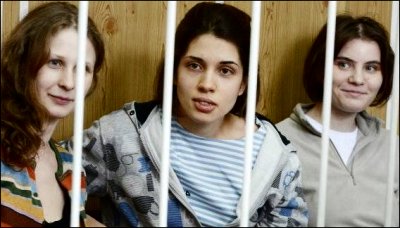
Maria Alekhina together with Nadezhda Tolokonnikova and Ekaterina Samutsevich, three of the members of the all-female group Pussy Riot, were charged with “hooliganism on grounds of religious hatred” after they sang a protest song in Moscow’s main Orthodox cathedral in February 2012.
All three were subsequently sentenced to two years imprisonment in a penal colony but later Ekaterina Samutsevich was given a suspended sentence on appeal.
Perm Region’s Berezniki City Court in the Ural, where Maria Alekhina is serving her sentence, denied the deferral on the grounds that her being a young mother had already been taken into account when passing her initial sentence last year. At the moment Maria Alekhina’s young son is being looked after by her mother. A similar bid was launched in October 2012 by Nadezhda Tolokonnikova.
“Today’s verdict is in line with the suppressive policies of the Russian authorities, stifling dissent in any form,” said Diaz-Jogeix
“For one stunt, clearly within their right to freedom of expression, the three punk singers had to endure months of humiliation and hardship in detention – something that continues for Maria Alekhina and Nadezhda Tolokonnikova.”
Amnesty International believes that the trial of the Pussy Riot singers was politically motivated, and that they were wrongfully prosecuted for what was a legitimate – if potentially offensive – protest action.
The organization considers Maria Alekhina and Nadezhda Tolokonnikova to be prisoners of conscience, detained solely for the peaceful expression of their beliefs.
Today Amnesty International members together with other Pussy Riot supporters around the world have been conducting support actions in solidarity with Maria Alekhina’s bid for release.
≡ link for email action amnesty international

fleursdumal.nl magazine
More in: REPRESSION OF WRITERS, JOURNALISTS & ARTISTS
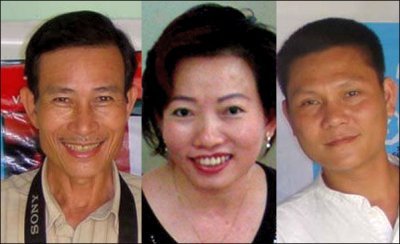
Amnesty International:
Release Vietnamese bloggers,
stop silencing dissent
Three Vietnamese bloggers given harsh prison sentences for alleged anti-state propaganda must be freed immediately, Amnesty International said ahead of their appeal hearing on 28 December 2012.
The bloggers were sentenced on 24 September 2012 after a trial lasting only a few hours.
Nguyen Van Hai, known as Dieu Cay (“the peasant’s pipe”) was sentenced to 12 years in prison; former policewoman Ta Phong Tan to 10 years; and Phan Thanh Hai, known as AnhBaSaiGon, to four years.
Their appeal hearing will take place at the Supreme People’s Court in Ho Chi Minh City.
“The bloggers’ sentences are a blatant attempt by the Vietnamese authorities to silence dissenting views,” said Rupert Abbott, Amnesty International’s Researcher on Viet Nam.
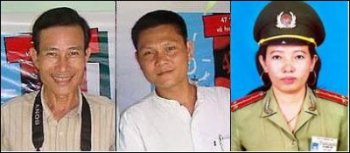
“We consider the bloggers to be prisoners of conscience, detained solely for the peaceful exercise of their right to freedom of expression through their online writings. They must be released immediately and without conditions.”
“The Vietnamese authorities have this year stepped up their harsh crackdown on voices critical of the government, with bloggers, songwriters, lawyers, labour activists, members of religious groups, democracy activists and others put behind bars.”
“This is a very worrying trend that must end – human rights defenders should be allowed to contribute to the development of their country, not fear prison because of their peaceful activities.”
≡ Website Amnesty International
fleursdumal.nl magazine
More in: REPRESSION OF WRITERS, JOURNALISTS & ARTISTS
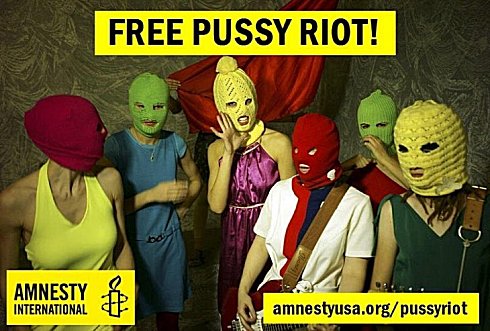
Pussy Riot:
Russian court orders conditional release of one,
other two jailed
The decision by a Moscow court to give Ekaterina Samutsevich a suspended sentence and release her while upholding jail sentences against Maria Alekhina and Nadezhda Tolokonnikova is only a half-measure in achieving justice for the three members of feminist punk group Pussy Riot, Amnesty International said.
“Any decision that shortens the wrongful detention of the three women is welcome. But no-one should be fooled – justice has not been done today. The government has introduced numerous new restrictions to freedom of expression in recent months. As this decision demonstrates, Russia’s judiciary is unlikely to offer much protection to those who fall foul of them”, said David Diaz-Jogeix, Europe and Central Asia Deputy Programme Director.
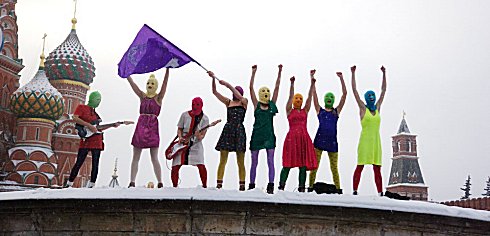
“The three women should not have been prosecuted in the first place. Maria Alekhina and Nadezhda Tolokonnikova should also be released immediately and unconditionally”, said David Diaz-Jogeix.
The organization considers the three convicted Pussy Riot members – Maria Alekhina, Ekaterina Samutsevich and Nadezhda Tolokonnikova – to be prisoners of conscience wrongfully prosecuted and convicted solely for the peaceful expression of their beliefs.
≡ Source: AMNESTY INTERNATIONAL
fleursdumal.nl magazine
More in: REPRESSION OF WRITERS, JOURNALISTS & ARTISTS

Teken petitie Amnesty International:
Rusland laat Pussy Riot vrij!
Drie leden van de Russische punkband Pussy Riot zijn veroordeeld tot twee jaar strafkamp voor het anti-Poetinlied dat zij zongen in een Moskouse kathedraal. De rechter vond hen schuldig aan ‘door religieuze haat gevoed hooliganisme’. Terwijl ze niets anders deden dan gebruikmaken van hun recht op vrije meningsuiting.
Vraag de Russische autoriteiten om de onmiddellijke vrijlating van de Pussy Riot-meiden. Onderteken deze petitie.

I am deeply concerned about the two-years prison sentences handed down to Maria Alekhina, Ekaterina Samutsevich and Nadezhda Tolokonnikova for performing a protest song in a cathedral as part of a feminist punk group “Pussy Riot”. The three young women have been found guilty of hooliganism under Article 213 of the Russian Criminal Code, for performing a protest song in Moscow’s Christ the Saviour Cathedral on February 21, 2012.
Amnesty International has declared these women to be prisoners of conscience, for they are detained solely for the peaceful expression of their beliefs. Therefore I respectfully urge you to immediately and unconditionally release Maria Alekhina, Ekaterina Samutsevich and Nadezhda Tolokonnikova
Furthermore, I call on you to immediately and impartially investigate threats received by the family members and lawyers of the three women and, if necessary, ensure their protection. Whether or not the women were involved in the performance in the cathedral, freedom of expression is a human right under Article 19 of the Universal Declaration of Human Rights, and no one should be jailed for the peaceful exercise of this right.
• SIGN PETITION AMNESTY INTERNATIONAL
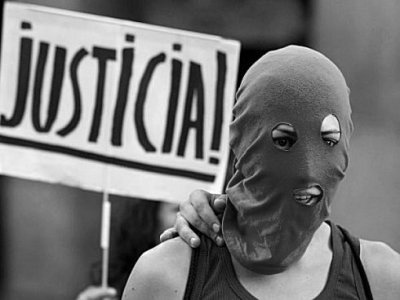
fleursdumal.nl magazine
More in: MUSEUM OF PUBLIC PROTEST, REPRESSION OF WRITERS, JOURNALISTS & ARTISTS

Russian court finds Pussy Riot guilty
A Russian court’s decision today to find members of the punk rock protest band Pussy Riot guilty of “hooliganism” is a bitter blow for freedom of expression in the country, Amnesty International said today.
Amnesty International said it believed that the trial of the Pussy Riot defendants – Maria Alekhina, Ekaterina Samutsevich and Nadezhda Tolokonnikova – was politically motivated, and that they were wrongfully prosecuted for what was a legitimate – if potentially offensive – protest action.
The organization considers all three activists to be prisoners of conscience, detained solely for the peaceful expression of their beliefs.
“The Russian authorities should release the members of Pussy Riot immediately and unconditionally,” said John Dalhuisen, Director of Amnesty International’s Europe and Central Asia Programme.
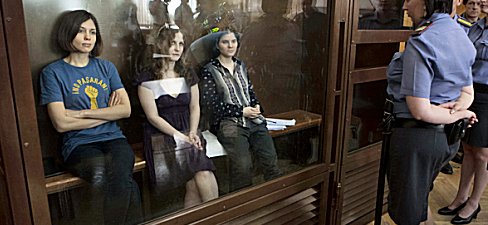
“A number of measures restricting the freedom of expression and association have been introduced in response to the wave of protest that accompanied the recent parliamentary and presidential elections. This trial is another example of the Kremlin’s attempts to discourage and delegitimize dissent. It is likely to backfire.”
Pussy Riot performed the protest song “Virgin Mary, redeem us from Putin” in Christ the Saviour Cathedral in Moscow on 21 February, with the group members covering their faces in balaclavas.
The song called on the Virgin Mary to become a feminist and banish Vladimir Putin. It also criticized the dedication and support shown to Putin by some Russian Orthodox Church representatives. It was one of a number of performances intended as a protest against Vladimir Putin in the run-up to Russia’s presidential elections in March.
The Russian authorities subsequently arrested Maria Alekhina and Nadezhda Tolokonnikova on 4 March, and Ekaterina Samutsevich on 15 March, claiming they were the masked singers.
The Pussy Riot trial started on 30 July in Moscow’s Khamovnicheskii District Court and was over in eight days. The judge dismissed most of the defence team’s requests to call up witnesses. There were concerns that fair trial standards might have been violated.

Russian court jails Pussy Riot for two years
A Russian court’s decision today to find guilty members of the punk rock protest band Pussy Riot is a bitter blow for freedom of expression in the country, Amnesty International said today.
Three members of the all-female group were charged with “hooliganism on grounds of religious hatred” after they sang a protest song in Moscow’s main Orthodox cathedral in February.
The judge sentenced them to two years imprisonment in a penal colony. The lawyers for the three said they were planning to appeal the decision.
Amnesty International said it believed that the trial of the Pussy Riot defendants – Maria Alekhina, Ekaterina Samutsevich and Nadezhda Tolokonnikova – was politically motivated, and that they were wrongfully prosecuted for what was a legitimate – if potentially offensive – protest action.
The organization considers all three activists to be prisoners of conscience, detained solely for the peaceful expression of their beliefs.
“The Russian authorities should overturn the court ruling and release the members of Pussy Riot immediately and unconditionally,” said John Dalhuisen, Director of Amnesty International’s Europe and Central Asia Programme.
“What Maria Alekhina, Nadezhda Tolokonnikova and Ekaterina Samutsevich did was calculated to shock – and did shock many. But in sentencing them to two years’ imprisonment, Russia has set the limits of freedom of expression in the wrong place.”
“A number of measures restricting the freedom of expression and association have been introduced in response to the wave of protest that accompanied the recent parliamentary and presidential elections. This trial is another example of the Kremlin’s attempts to discourage and delegitimize dissent. It is likely to backfire.”
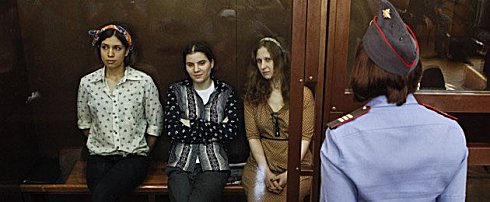
Background
Pussy Riot performed the protest song “Virgin Mary, redeem us from Putin” in Christ the Saviour Cathedral in Moscow on 21 February, with the group members covering their faces in balaclavas.
The song called on the Virgin Mary to become a feminist and banish Vladimir Putin. It also criticised the dedication and support shown to Putin by some Russian Orthodox Church representatives. It was one of a number of performances intended as a protest against Vladimir Putin in the run-up to Russia’s presidential elections in March.
The Russian authorities subsequently arrested Maria Alekhina and Nadezhda Tolokonnikova on 4 March, and Ekaterina Samutsevich on 15 March, claiming they were the masked singers.
The Pussy Riot trial started on 30 July in Moscow’s Khamovnicheskii District Court and was over in eight days. The judge dismissed most of the defence team’s requests to call up witnesses. There were concerns that fair trial standards might have been violated.
The case generated a wide debate on blogs, social networks and in the media about freedom of expression, the place of the Church in a modern secular state and the independence of courts.
In June, more than 200 Russian cultural figures, well-known writers, musicians and actors, among others, signed an open letter in support of Maria Alekhina, Nadezhda Tolokonnikova and Ekaterina Samutsevich. It was then posted on the Echo Moskvy radio web site and collected around 45,000 further signatures.
Also in June, a group of Orthodox believers sent an open letter to Patriarch Kirill, the leader of the Russian Orthodox Church, asking for mercy for the three arrested women.
In August, a group of lawyers published an open letter in which they stated that the actions of the three women could not be qualified as a crime and that bringing charges against them was in violation of the Russian law.
The Pussy Riot case received a broad coverage abroad and generated the support of many international artists, including Sting, Madonna, Yoko Ono and Bjork.
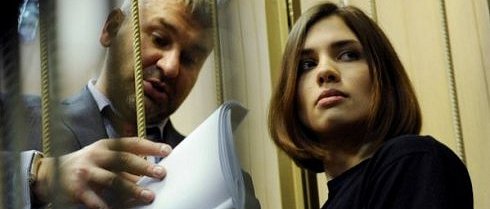
Source: Website Amnesty International
fleursdumal.nl magazine
More in: # Music Archive, Art & Literature News, MUSEUM OF PUBLIC PROTEST, PRESS & PUBLISHING, REPRESSION OF WRITERS, JOURNALISTS & ARTISTS, STREET POETRY
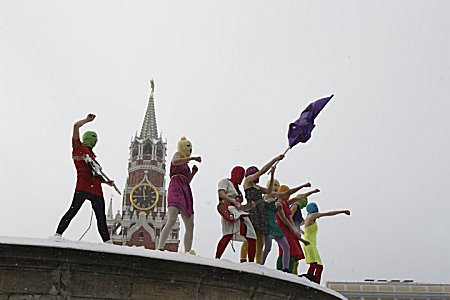
Russia urged to release ‘Pussy Riot’ group as court prolongs detention
A court in Moscow has ruled that three members of the female punk group Pussy Riot must remain in custody for six months after singing a protest song in Moscow’s main Orthodox church, prompting Amnesty International to reiterate its call for their immediate release.
Maria Alekhina, Ekaterina Samutsevich and Nadezhda Tolokonnikova, who are accused of “hooliganism on the grounds of religious hatred”, face possible prison sentences of up to seven years.
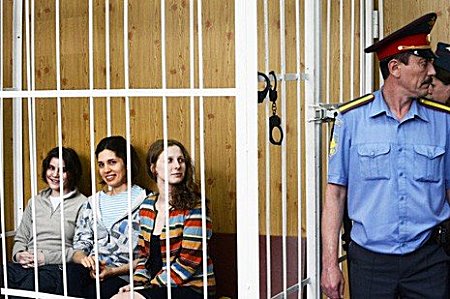
“These three activists have now been behind bars for months,awaiting a trial that should not be taking place, ” said Amnesty International Europe and Central Asia Programme Director John Dalhuisen.
“Even if the three arrested women did take part in the protest, the severity of the response of the Russian authorities and the detention on the serious criminal charge of hooliganism would not be a justifiable response to the peaceful – if, to many, offensive – expression of their political beliefs.”
The preliminary hearing of the case will continue next week, on 23 July.
Amnesty International considers the activists to be prisoners of conscience, detained solely for the peaceful expression of their beliefs.

“The Russian authorities must drop the charges of hooliganism and immediately and unconditionally release these three women, ” said Dalhuisen.
The protest song Virgin Mary, redeem us of Putin was performed in Christ the Saviour Cathedral in Moscow on 21 February 2012 by several members of the feminist Pussy Riot group with their faces covered in balaclavas.
The song calls on Virgin Mary to become a feminist and banish Vladimir Putin. It also criticises the dedication and support shown to Putin by some representatives of the Russian Orthodox Church.
It was one of a number of performances intended as a protest against Vladimir Putin in the run-up to Russia’s presidential elections in March.
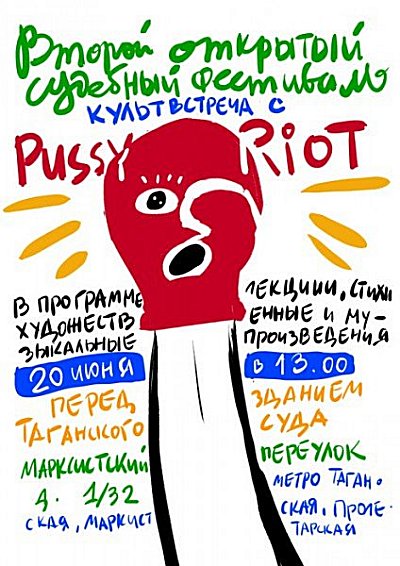
The Russian authorities subsequently arrested Maria Alekhina and Nadezhda Tolokonnikova on 4 March and Ekaterina Samusevich on 15 March, claiming they were the masked singers.
One of the women, Nadezhda Tolokonnikova, admitted to being a member of the larger ‘Pussy Riot’ group and taking part in the protest while the other two deny any involvement in the cathedral protest.
Since its establishment in 2011, the Pussy Riot group has conducted several performances in public places such as the Moscow underground, Red Square and on the roofs of buses.
In media interviews the group members have stated that they protest against, among other things, stifling of freedom of expression and assembly in Russia, the unfair political process and the fabrication of criminal cases against opposition activists.
The European Court of Human Rights has repeatedly held that freedom of expression applies not only to inoffensive ideas, “but also to those that offend, shock or disturb the State or any sector of the population”.
“Even if the action was calculated to shock and was known to be likely to cause offence, the activists left the Cathedral when requested to do so and caused no damage,” said Dalhuisen.
“The entire action lasted only a few minutes and caused only minimal disruption to those using the Cathedral for other, notably religious, purposes.”
“The broader political context surrounding the anti-Putin protests at the time – and the anticlerical, anti-Putin content of the activists’ message (themselves unpunishable) – have clearly and unlawfully been taken into account in the charges that have been brought against them.”

A video montage of the song available on the internet has led to a wide debate about the protest. The press secretary of President-elect Vladimir Putin called the protest despicable and said it would be followed up “with all the necessary consequences”.
Although a representative of the Orthodox Church initially called for mercy for the protestors, subsequent statements by representatives of the Church have called for harsh punishment and for the women to be prosecuted for inciting hatred on grounds of religion. The women’s relatives have reportedly also received anonymous death threats.
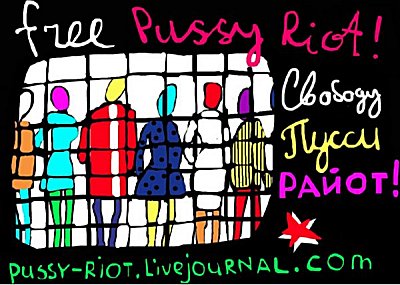
≡ Website Amnesty International
fleursdumal.nl magazine
More in: MUSEUM OF PUBLIC PROTEST, REPRESSION OF WRITERS, JOURNALISTS & ARTISTS
Thank you for reading Fleurs du Mal - magazine for art & literature